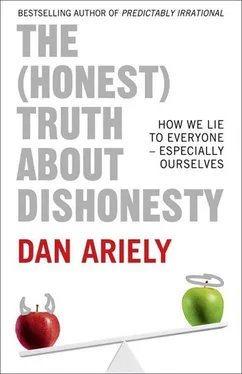Ariely, Dan - The (Honest) Truth About Dishonesty - How We Lie to Everyone – Especially Ourselves
Здесь есть возможность читать онлайн «Ariely, Dan - The (Honest) Truth About Dishonesty - How We Lie to Everyone – Especially Ourselves» весь текст электронной книги совершенно бесплатно (целиком полную версию без сокращений). В некоторых случаях можно слушать аудио, скачать через торрент в формате fb2 и присутствует краткое содержание. Жанр: Старинная литература, на английском языке. Описание произведения, (предисловие) а так же отзывы посетителей доступны на портале библиотеки ЛибКат.
- Название:The (Honest) Truth About Dishonesty: How We Lie to Everyone – Especially Ourselves
- Автор:
- Жанр:
- Год:неизвестен
- ISBN:нет данных
- Рейтинг книги:4 / 5. Голосов: 1
-
Избранное:Добавить в избранное
- Отзывы:
-
Ваша оценка:
- 80
- 1
- 2
- 3
- 4
- 5
The (Honest) Truth About Dishonesty: How We Lie to Everyone – Especially Ourselves: краткое содержание, описание и аннотация
Предлагаем к чтению аннотацию, описание, краткое содержание или предисловие (зависит от того, что написал сам автор книги «The (Honest) Truth About Dishonesty: How We Lie to Everyone – Especially Ourselves»). Если вы не нашли необходимую информацию о книге — напишите в комментариях, мы постараемся отыскать её.
The (Honest) Truth About Dishonesty: How We Lie to Everyone – Especially Ourselves — читать онлайн бесплатно полную книгу (весь текст) целиком
Ниже представлен текст книги, разбитый по страницам. Система сохранения места последней прочитанной страницы, позволяет с удобством читать онлайн бесплатно книгу «The (Honest) Truth About Dishonesty: How We Lie to Everyone – Especially Ourselves», без необходимости каждый раз заново искать на чём Вы остановились. Поставьте закладку, и сможете в любой момент перейти на страницу, на которой закончили чтение.
Интервал:
Закладка:
To look into purely altruistic cheating, we introduced a condition in which the fruit of each participant’s cheating would benefit only their partner. What did we find? As it turns out, altruism is indeed a strong motivator for cheating. When cheating was carried out for purely altruistic reasons and the cheaters themselves did not gain anything from their act, overclaiming increased to an even larger degree.
Why might this be the case? I think that when both we and another person stand to benefit from our dishonesty, we operate out of a mix of selfish and altruistic motives. In contrast, when other people, and only other people, stand to benefit from our cheating, we find it far easier to rationalize our bad behavior in purely altruistic ways and subsequently we further relax our moral inhibitions. After all, if we are doing something for the pure benefit of others, aren’t we indeed a little bit like Robin Hood? *
FINALLY, IT ISworthwhile to say something more explicit about performance in the many control conditions that we had in this set of experiments. For each of our cheating conditions (individual shredder, group with shredder, distant group with shredder, friendly group with shredder, altruistic payoff with shredder), we also had a control condition in which there was no opportunity to cheat (that is, no shredder). Looking across these many different control conditions allowed us to see if the nature of collaboration influenced the level of performance. What we found was that performance was the same across all of these control conditions. Our conclusion? It seems that performance doesn’t necessarily improve when people work in groups—at least not as much as we’ve all been led to believe.
OF COURSE, WEcannot survive without the help of others. Working together is a crucial element of our lives. But clearly, collaboration is a double-edged sword. On the one hand, it increases enjoyment, loyalty, and motivation. On the other hand, it carries with it the increased potential for cheating. In the end—and very sadly—it may be that the people who care the most about their coworkers end up cheating the most. Of course, I am not advocating that we stop working in groups, stop collaborating, or stop caring about one another. But we do need to recognize the potential costs of collaboration and increased affinity.
The Irony of Collaborative Work
If collaboration increases dishonesty, what can we do about it? One obvious answer is to increase monitoring. In fact, this seems to be the default response of the government’s regulators to every instance of corporate misconduct. For example, the Enron fiasco brought about a large set of reporting regulations known as the Sarbanes-Oxley Act, and the financial crisis of 2008 ushered in an even larger set of regulations (largely emerging from the Dodd-Frank Wall Street Reform and Consumer Protection Act), which were designed to regulate and increase the supervision of the financial industry.
To some degree, there is no question that monitoring can be helpful, but it is also clear from our results that increased monitoring alone is unlikely to completely overcome our ability to justify our own dishonesty—particularly when others stand to gain from our misbehavior (not to mention the high financial costs of compliance with such regulations).
In some cases, instead of adding layers and layers of rules and regulations, perhaps we could set our sights on changing the nature of group-based collaboration. An interesting solution to this problem was recently implemented in a large international bank by a former student of mine named Gino. To allow his team of loan officers to work together without risking increased dishonesty (for example, by recording the value of the loans as higher than they really were in an effort to show larger short-run profits), he set up a unique supervisory system. He told his loan officers that an outside group would review their processing and approval of loan applications. The outside group was socially disconnected from the loan-making team and had no loyalty or motivation to help out the loan officers. To make sure that the two groups were separated, Gino located them in different office buildings. And he ensured that they had no direct dealings with each other or even knew the individuals in the other group.
I tried to get the data from Gino in order to evaluate the success of his approach, but the lawyers of this large bank stopped us. So, I don’t know whether this approach worked or how his employees felt about the arrangement, but I suspect that this mechanism had at least some positive outcomes. It probably decreased the fun that the loan work group had during their meetings. It likely also increased the stress surrounding the groups’ decisions, and it was certainly not cheap to implement. Nevertheless, Gino told me that overall, adding the objective and anonymous monitoring element seemed to have a positive effect on ethics, morals, and the bottom line.
CLEARLY, THERE AREno silver bullets for the complex issue of cheating in group settings. Taken together, I think that our findings have serious implications for organizations, especially considering the predominance of collaborative work in our day-to-day professional lives. There is also no question that better understanding the extent and complexity of dishonesty in social settings is rather depressing. Still, by understanding the possible pitfalls involved in collaboration, we can take some steps toward rectifying dishonest behavior.
CHAPTER 10
A Semioptimistic Ending
People Don’t Cheat Enough!
Throughout this book, we’ve seen that honesty and dishonesty are based on a mixture of two very different types of motivation. On the one hand, we want to benefit from cheating (this is the rational economic motivation), while on the other, we want to be able to view ourselves as wonderful human beings (this is the psychological motivation). You might think that we can’t achieve both of these objectives at the same time—that we can’t have our cake and eat it too, so to speak—but the fudge factor theory we have developed in these pages suggests that our capacity for flexible reasoning and rationalization allows us to do just that. Basically, as long as we cheat just a little bit, we can have the cake and eat (some of) it too. We can reap some of the benefits of dishonesty while maintaining a positive image of ourselves.
As we’ve seen, certain forces—such as the amount of money we stand to gain and the probability of being caught—influence human beings surprisingly less than one might think. And at the same time other forces influence us more than we might expect: moral reminders, distance from money, conflicts of interest, depletion, counterfeits, reminders of our fabricated achievements, creativity, witnessing others’ dishonest acts, caring about others on our team, and so on.
ALTHOUGH THE FOCUSof the various experiments presented here was on dishonesty, it is also important to remember that most of the participants in our experiments were nice people from good universities who will likely attain positions of some power and influence later on in life. They were not the kind of people one typically associates with cheating. In fact, they were just like you, me, and most of the people on this planet, which means that all of us are perfectly capable of cheating a little bit.
Though that may sound pessimistic, the half-full part of the story is that human beings are, by and large, more moral than standard economic theory predicts. In fact, seen from a purely rational (SMORC) perspective, we humans don’t cheat nearly enough. Consider how many times in the last few days you’ve had the opportunity to cheat without getting caught. Perhaps a colleague left her purse on her desk while she was away for a long meeting. Maybe a stranger in a coffee shop asked you to watch her laptop while she went to the restroom. Maybe a grocery clerk missed an item in your cart or you passed an unlocked bicycle on an empty street. In any of those situations, the SMORC thing to do would be to take the money, laptop, or bike or not mention the missed item. Yet we pass up the vast majority of these opportunities every day without thinking that we should take them. This means that we’re off to a good start in our effort to improve our moral fiber.
Читать дальшеИнтервал:
Закладка:
Похожие книги на «The (Honest) Truth About Dishonesty: How We Lie to Everyone – Especially Ourselves»
Представляем Вашему вниманию похожие книги на «The (Honest) Truth About Dishonesty: How We Lie to Everyone – Especially Ourselves» списком для выбора. Мы отобрали схожую по названию и смыслу литературу в надежде предоставить читателям больше вариантов отыскать новые, интересные, ещё непрочитанные произведения.
Обсуждение, отзывы о книге «The (Honest) Truth About Dishonesty: How We Lie to Everyone – Especially Ourselves» и просто собственные мнения читателей. Оставьте ваши комментарии, напишите, что Вы думаете о произведении, его смысле или главных героях. Укажите что конкретно понравилось, а что нет, и почему Вы так считаете.












